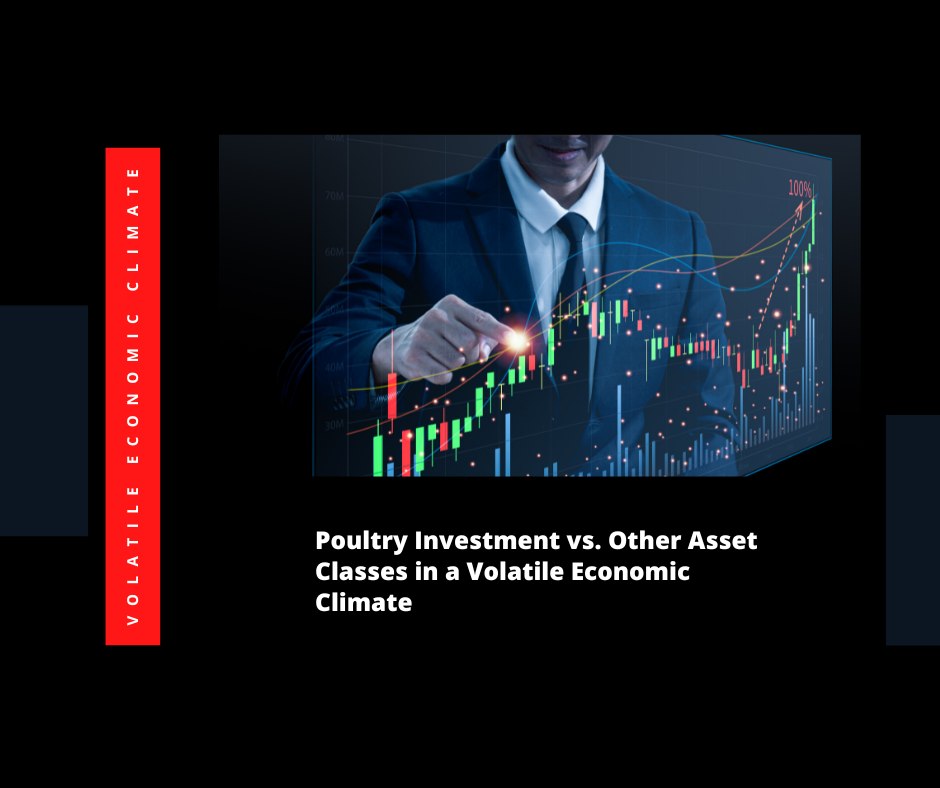- Bizquick Estates & Overseas Pvt Ltd
- +1-725-207-3489
- +91-774-508-5581

In times of economic uncertainty, investors naturally seek safe havens to protect their wealth while still achieving growth. The performance of traditional asset classes—stocks, bonds, real estate, and commodities—can become unpredictable during periods of high inflation, political instability, or market volatility. However, an alternative investment that is often overlooked but can provide stable returns is poultry farming. This blog post explores the merits of poultry investment compared to other asset classes in a volatile economic climate.
The Appeal of Poultry Investment
Poultry farming, particularly in emerging markets, offers a tangible and essential product: food. Unlike other investments that are largely influenced by market sentiment and macroeconomic forces, poultry farming responds to basic human needs. Here’s why poultry investment can be resilient in tough economic times:
Consistent Demand: The demand for poultry products, including eggs and meat, remains stable regardless of economic conditions. In fact, during periods of inflation, food prices often rise, which can benefit producers. As poultry is one of the most affordable sources of protein, it remains a staple even when household budgets shrink.
Hedge Against Inflation: Poultry farming can act as a natural hedge against inflation. As the cost of living rises, food prices typically follow suit. Poultry farmers may pass on increased production costs to consumers, ensuring that profit margins are maintained or even improved.
Scalability and Diversification: Poultry farming offers opportunities for scalability, allowing investors to start small and expand gradually. Diversifying within the sector—by raising different breeds, producing both eggs and meat, or even investing in value-added products like organic or free-range chicken—can reduce risk and increase revenue streams.
Government Support and Incentives: In many countries, governments offer subsidies, tax incentives, or grants to encourage agricultural production, including poultry farming. This can reduce the initial capital outlay and improve the long-term profitability of the investment.
Shorter Production Cycles: Compared to other agricultural ventures like cattle farming, poultry has a shorter production cycle, meaning quicker returns on investment. Broilers, for example, can be ready for market in as little as 6-8 weeks, allowing farmers to react more swiftly to market demand.
Stocks
Stocks represent ownership in a company, and their value is subject to the performance of that company and overall market conditions. In a volatile economic climate, stock markets can experience severe fluctuations, making it difficult for investors to predict returns. While some sectors like technology or healthcare may outperform in tough times, others can suffer due to reduced consumer spending and lower corporate earnings.
Poultry farming, on the other hand, is less correlated to the stock market and more aligned with the essential needs of the population. The stability in demand for poultry products can offer a buffer against the unpredictability of stock prices.
Bonds
Bonds, particularly government bonds, are traditionally seen as safe investments during economic downturns. However, in a high-inflation environment, bond yields may not keep pace with rising prices, leading to a loss in real value. Additionally, corporate bonds carry the risk of default, especially in a recessionary environment.
Poultry investment, while not as liquid as bonds, can provide higher returns due to the consistent demand for food products and the potential for price increases in line with inflation.
Real Estate
Real estate is a tangible asset that often retains value during inflationary periods. However, the housing market can also be sensitive to interest rates and broader economic conditions. In a volatile climate, rising interest rates can reduce property affordability, leading to a slowdown in demand and price corrections. Furthermore, real estate requires significant capital and is less liquid than other asset classes.
Poultry farming, while also requiring capital, can offer more immediate cash flow through the sale of eggs or meat. It is also less susceptible to interest rate fluctuations, though it does carry its own risks, such as disease outbreaks and feed costs.
Commodities
Commodities like gold and oil are often used as hedges during economic uncertainty. Gold, in particular, is a go-to asset when investors fear currency devaluation or market crashes. However, commodities are subject to global supply and demand dynamics and can be highly volatile themselves.
Poultry investment, while also tied to commodity inputs (such as feed), tends to experience less price volatility. The essential nature of food products means that demand remains relatively constant, regardless of fluctuations in commodity markets.
While poultry farming offers numerous advantages, it is not without risks. Disease outbreaks, such as avian flu, can devastate a poultry business if proper biosecurity measures aren’t in place. Additionally, feed prices, which are often linked to global commodity prices, can impact profit margins. Investors also need to consider the operational challenges of running a farm, including labor management, regulatory compliance, and market access.
Poultry investment presents a compelling case as a resilient and profitable alternative in a volatile economic climate. While it requires a more hands-on approach compared to traditional asset classes like stocks and bonds, the consistent demand for poultry products and the ability to hedge against inflation can make it a worthwhile consideration for investors. By diversifying into poultry farming, investors can not only protect their wealth but also tap into a growing industry that directly meets essential human needs.
In conclusion, while no investment is entirely immune to economic fluctuations, poultry farming offers a unique blend of stability, profitability, and scalability, making it a strong contender in a diversified portfolio during turbulent times.
Bizquick Estates & Overseas Pvt Ltd
Bizquick aims to be one of the leaders in managed business. Bizquick develops, produces, manages, harvests, processes and markets the products by covering the entire process.
Passive Income
Your path to passive income for lifetime starts with Bizquick